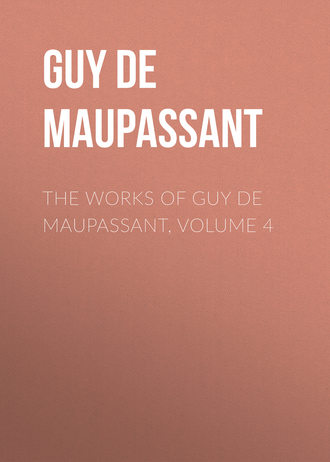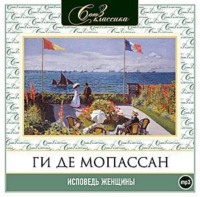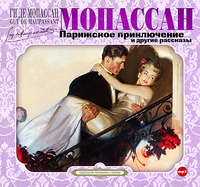 полная версия
полная версияThe Works of Guy de Maupassant, Volume 4
And Monsieur de Courville made no reply, as he felt rather confused himself.
THE SUBSTITUTE
"Madame Bonderoi?"
"Yes, Madame Bonderoi."
"Impossible."
"I tell you it is."
Madame Bonderoi, the old lady in a lace cap, the devout, the holy, the honorable Madame Bonderoi, whose little false curls looked as if they were glued round her head.
"That is the very woman."
"Oh! Come, you must be mad."
"I swear to you that it is Madame Bonderoi."
"Then please give me the details."
"Here they are. During the life of Monsieur Bonderoi, the lawyer, people said that she utilized his clerks for her own particular service. She is one of those respectable middle-class women, with secret vices, and inflexible principles, of whom there are so many. She liked good-looking young fellows, and I should like to know what is more natural than that? Do not we all like pretty girls?"
"As soon as old Bonderoi was dead, his widow began to live the peaceful and irreproachable life of a woman with a fair, fixed income. She went to church assiduously, and spoke evil of her neighbors, but gave no handle to anyone for speaking ill of her, and when she grew old she became the little wizened, sour-faced, mischievous woman whom you know. Well, this adventure, which you would scarcely believe, happened last Friday.
"My friend, Jean d'Anglemare, is, as you know, a captain in a dragoon regiment, who is quartered in the barracks in the Rue de la Rivette, and when he got to his quarters the other morning, he found that two men of his squadron had had a terrible quarrel. The rules about military honor are very severe, and so a duel took place between them. After the duel they became reconciled, and when their officer questioned them, they told him what their quarrel had been about. They had fought on Madame Bonderoi's account."
"Oh!"
"Yes, my dear fellow, about Madame Bonderoi."
"But I will let Trooper Siballe speak."
"This is how it was, Captain. About a year and a half ago, I was lounging about the barrack-yard, between six and seven o'clock in the evening, when a woman came up and spoke to me, and said, just as if she had been asking her way: 'Soldier, would you like to earn ten francs a week, honestly?' Of course, I told her that I decidedly should, and so she said: 'Come and see me at twelve o'clock to-morrow morning. I am Madame Bonderoi, and my address is No. 6, Rue de la Tranchée.' 'You may rely upon my being there, Madame.' And then she went away, looking very pleased, and she added: 'I am very much obliged to you, soldier.' 'I am obliged to you, Madame,' I replied. But I plagued my head about the matter, until the time came, all the same.
"At twelve o'clock, exactly, I rang the bell, and she let me in herself. She had a lot of ribbons on her head.
"'We must make haste,' she said; 'as my servant might come in.'
"'I am quite willing to make haste,' I replied, 'but what am I to do?'
"But she only laughed, and replied: 'Don't you understand, you great knowing fellow?'
"I was no nearer her meaning, I give you my word of honor, Captain, but she came and sat down by me, and said:
"'If you mention this to anyone, I will have you put in prison, so swear that you will never open your lips about it.'
"I swore whatever she liked, though I did not at all understand what she meant, and my forehead was covered with perspiration, so I took my pocket-handkerchief out of my helmet, and she took it and wiped my brow with it; then she kissed me, and whispered: 'Then you will?' 'I will do anything you like, Madame,' I replied, 'as that is what I came for.'
"Then she made herself clearly understood by her actions, and when I saw what it was, I put my helmet onto a chair, and showed her that in the dragoons a man never retires, Captain.
"Not that I cared much about it, for she was certainly not in her prime, but it is no good being too particular in such a matter, as ten francs are scarce, and then I have relations whom I like to help, and I said to myself: 'There will be five francs for my father, out of that.'
"When I had done my allotted task, Captain, I got ready to go, though she wanted me to stop longer, but I said to her:
"'To everyone their due, Madame. A small glass of brandy costs two sous, and two glasses cost four.'
"She understood my meaning, and put a gold ten-franc piece into my hand. I do not like that coin, because it is so small that if your pockets are not very well made, and come at all unsewn, one is apt to find it in one's boots, or not to find it at all, and so, while I was looking at it, she was looking at me. She got red in the face, as she had misunderstood my looks, and she said: 'Is not that enough?'
"'I did not mean that, Madame,' I replied; 'but if it is all the same to you, I would rather have two five-franc pieces.' And she gave them to me, and I took my leave. This has been going on for a year and a half, Captain. I go every Tuesday evening, when you give me leave to go out of barracks; she prefers that, as her servant has gone to bed then, but last week I was not well, and I had to go into the infirmary. When Tuesday came, I could not get out, and I was very vexed, because of the ten francs which I had been receiving every week, and I said to myself:
"'If anybody goes there, I shall be done; and she will be sure to take an artilleryman, and that made me very angry. So I sent for Paumelle, who comes from my part of the country, and I told him how matters stood:
"'There will be five francs for you, and five for me,' I said. He agreed, and went, as I had given him full instructions. She opened the door as soon as he knocked, and let him in, and as she did not look at his face, she did not perceive that it was not I, for, you know, Captain, one dragoon is very like another, with their helmets on.
"Suddenly, however, she noticed the change, and she asked, angrily: 'Who are you? What do you want? I do not know you.'
"Then Paumelle explained matters; he told her that I was not well, and that I had sent him as my substitute; so she looked at him, made him also swear to keep the matter secret, and then she accepted him, as you may suppose, for Paumelle is not a bad-looking fellow, either. But when he came back, Captain, he would not give me my five francs. If they had been for myself, I should not have said a word, but they were for my father, and on that score, I would stand no nonsense, and I said to him:
"'You are not particular in what you do, for a dragoon; you are a discredit to your uniform.'
"He raised his fist, Captain, saying that fatigue duty like that was worth double. Of course, everybody has his own ideas, and he ought not to have accepted it. You know the rest."
"Captain d'Anglemare laughed until he cried as he told me the story, but he also made me promise to keep the matter a secret, just as he had promised the two soldiers. So, above all, do not betray me, but promise me to keep it to yourself."
"Oh! You may be quite easy about that. But how was it all arranged, in the end?"
"How? It is a joke in a thousand!.. Mother Bonderoi keeps her two dragoons, and reserves his own particular day for each of them, and in that way everybody is satisfied."
"Oh! That is capital! Really capital!"
"And he can send his old father and mother the money as usual, and thus morality is satisfied."
THE RELIC
To the Abbé Louis d'Ennemare, at Soissons.
"My Dear Abbé:
"My marriage with your cousin is broken off in the stupidest manner, on account of a stupid trick which I almost involuntarily played my intended, in my embarrassment, and I turn to you, my old schoolfellow, for you may be able to help me out of the difficulty. If you can, I shall be grateful to you until I die.
"You know Gilberte, or rather you think you know her, for do we ever understand women? All their opinions, their ideas, their creeds, are a surprise to us. They are all full of twists and turns, of the unforeseen, of unintelligible arguments, or defective logic and of obstinate ideas, which seem final, but which they alter because a little bird came and perched on the window ledge.
"I need not tell you that your cousin is very religious, as she was brought up by the White (or was it the Black?) Ladies at Nancy. You know that better than I do, but what you perhaps do not know, is, that she is just as excitable about other matters as she is about religion. Her head flies away, just like a leaf being whirled away by the wind; and she is a woman, or rather a girl, more so than many are, for she is moved, or made angry in a moment, starting off at a gallop after affection, just as she does after hatred, and returning in the same manner; and she is as pretty … as you know, and more charming than I can say … as you will never know.
"Well, we became engaged, and I adored her, as I adore her still, and she appeared to love me.
"One evening, I received a telegram summoning me to Cologne for a consultation, which might be followed by a serious and difficult operation, and as I had to start the next morning, I went to wish Gilberte goodbye, and tell her why I could not dine with them on Wednesday, but on Friday, the day of my return. Ah! Take care of Fridays, for I assure you they are unlucky!
"When I told her that I had to go to Germany, I saw that her eyes filled with tears, but when I said I should be back very soon, she clapped her hands, and said:
"'I am very glad you are going, then! You must bring me back something; a mere trifle, just a souvenir, but a souvenir that you have chosen for me. You must find out what I should like best, do you hear? And then I shall see whether you have any imagination.'
"She thought for a few moments, and then added:
"'I forbid you to spend more than twenty francs on it. I want it for the intention, and for the remembrance of your penetration, and not for its intrinsic value.'
"And then, after another moment's silence, she said, in a low voice, and with downcast eyes.
"'If it costs you nothing in money, and if it is something very ingenious and pretty, I will … I will kiss you.'
"The next day, I was in Cologne. It was the case of a terrible accident, which had thrown a whole family into despair, and a difficult amputation was necessary. They put me up; I might say, they almost locked me up, and I saw nobody but people in tears, who almost deafened me with their lamentations; I operated on a man who appeared to be in a moribund state, and who nearly died under my hands, and with whom I remained two nights, and then, when I saw that there was a chance for his recovery, I drove to the station. I had, however, made a mistake in the trains, and I had an hour to wait, and so I wandered about the streets, still thinking of my poor patient, when a man accosted me. I do not know German, and he was totally ignorant of French, but at last I made out that he was offering me some relics. I thought of Gilberte, for I knew her fanatical devotion, and here was my present ready to hand, so I followed the man into a shop where religious objects were for sale, and I bought a small piece of a bone of one of the Eleven Thousand Virgins.
"The pretended relic was enclosed in a charming, old silver box, and that determined my choice, and putting my purchase into my pocket, I went to the railway station, and so to Paris.
"As soon as I got home, I wished to examine my purchase again, and on taking hold of it, I found that the box was open, and the relic lost! It was no good to hunt in my pocket, and to turn it inside out; the small bit of bone, which was no bigger than half a pin, had disappeared.
"You know, my dear little Abbé, that my faith is not very great, but, as my friend, you are magnanimous enough to put up with my coldness, and to leave me alone, and to wait for the future, so you say. But I absolutely disbelieve in the relics of second-hand dealers in piety, and you share my doubts in that respect. Therefore, the loss of that bit of sheep's carcass did not grieve me, and I easily procured a similar fragment, which I carefully fastened inside my jewel, and then I went to see my intended.
"As soon as she saw me, she ran up to me, smiling and anxious, and said to me:
"'What have you brought me?'
"I pretended to have forgotten, but she did not believe me, and I made her beg me, and beseech me, even. But when I saw that she was devoured by curiosity, I gave her the sacred silver box. She appeared over-joyed.
"'A relic! Oh! A relic!'
"And she kissed the box passionately, so that I was ashamed of my deception. She was not quite satisfied, however, and her uneasiness soon turned to terrible fear, and looking straight into my eyes, she said:
"'Are you sure that it is authentic?'
"'Absolutely certain.'
"'How can you be so certain?'
"I was caught, for to say that I had bought it through a man in the streets, would be my destruction. What was I to say? A wild idea struck me, and I said, in a low, mysterious voice:
"'I stole it for you.'
"She looked at me with astonishment and delight in her large eyes.
"'Oh! You stole it? Where?'
"'In the cathedral; in the very shrine of the Eleven Thousand Virgins.'
"Her heart beat with pleasure, and she murmured:
"'Oh! Did you really do that … for me? Tell me … all about it!'
"There was an end of it, and I could not go back. I made up a fanciful story, with precise details. I had given the custodian of the building a hundred francs to be allowed to go about the building by myself; the shrine was being repaired, but I happened to be there at the breakfast time of the workmen and clergy; by removing a small panel, I had been enabled to seize a small piece of bone (oh! so small), among a quantity of others, (I said a quantity, as I thought of the amount that the remains of the skeletons of eleven thousand virgins must produce). Then I went to a goldsmith's and bought a casket worthy of the relic; and I was not sorry to let her know that the silver box cost me five hundred francs.
"But she did not think of that; she listened to me, trembling; in an ecstasy, and whispering:
"'How I love you!' she threw herself into my arms.
"Just note this: I had committed sacrilege for her sake. I had committed a theft; I had violated a shrine; violated and stolen holy relics, and for that she adored me, thought me loving, tender, divine. Such is woman, my dear Abbé.
"For two months I was the best of lovers. In her room, she had made a kind of magnificent chapel in which to keep this bit of mutton chop, which, as she thought, had made me commit that love-crime, and she worked up her religious enthusiasm in front of it every morning and evening. I had asked her to keep the matter secret, for fear, as I said, that I might be arrested, condemned and given over to Germany, and she kept her promise.
"Well, at the beginning of the summer, she was seized with an irresistible wish to see the scene of my exploit, and she begged her father so persistently (without telling him her secret reason), that he took her to Cologne, but without telling me of their trip, according to his daughter's wish.
"I need not tell you that I had not seen the interior of the cathedral. I do not know where the tomb (if there be a tomb), of the Eleven Thousand Virgins is, and then, it appears that it is unapproachable, alas!
"A week afterwards, I received ten lines, breaking off our engagement, and then an explanatory letter from her father, whom she had, somewhat late, taken into her confidence.
"At the sight of the shrine, she had suddenly seen through my trickery and my lie, and had also found out that I was innocent of any other crime. Having asked the keeper of the relics whether any robbery had been committed, the man began to laugh, and pointed out to them how impossible such a crime was, but from the moment I had plunged my profane hand into venerable relics, I was no longer worthy of my fair-haired and delicate betrothed.
"I was forbidden the house; I begged and prayed in vain, nothing could move the fair devotee, and I grew ill from grief. Well, last week, her cousin, Madame d'Arville, who is yours also, sent word to me that she should like to see me, and when I called, she told me on what conditions I might obtain my pardon, and here they are. I must bring her a relic, a real, authentic relic, certified to be such by Our Holy Father, the Pope, of some virgin and martyr, and I am going mad from embarrassment and anxiety.
"I will go to Rome, if needful, but I cannot call on the Pope unexpectedly, and tell him my stupid adventure; and, besides, I doubt whether they let private individuals have relics. Could not you give me an introduction to some cardinal, or only to some French prelate, who possesses some remains of a female saint? Or perhaps you may have the precious object she wants in your collection?
"Help me out of my difficulty, my dear Abbé, and I promise you that I will be converted ten years sooner than I otherwise should be!
"Madame d'Arville, who takes the matter seriously, said to me the other day:
"'Poor Gilberte will never marry.'
"My dear old schoolfellow, will you allow your cousin to die the victim of a stupid piece of business on my part? Pray prevent her from being the eleventh thousand and one virgin.
"Pardon me, I am unworthy, but I embrace you, and love you with all my heart.
"Your old friend,
"Henri Fontal."
THE MAN WITH THE BLUE EYES
Monsieur Pierre Agénor de Vargnes, the Examining Magistrate, was the exact opposite of a practical joker. He was dignity, staidness, correctness personified. As a sedate man, he was quite incapable of being guilty, even in his dreams, of anything resembling a practical joke, however remotely. I know nobody to whom he could be compared, unless it be the present president of the French Republic. I think it is useless to carry the analogy any further, and having said thus much, it will be easily understood that a cold shiver passed through me when Monsieur Pierre Agénor de Vargnes did me the honor of sending a lady to wait on me.
At about eight o'clock, one morning last winter, as he was leaving the house to go to the Palais de Justice, his footman handed him a card, on which was printed:
DOCTOR JAMES FERDINAND,
Member of the Academy of Medicine,
Port-au-Prince,
Chevalier of the Legion of Honor.
At the bottom of the card, there was written in pencil:
From Lady Frogère
Monsieur de Vargnes knew the lady very well, who was a very agreeable Creole from Haiti, and whom he had met in many drawing-rooms, and, on the other hand, though the doctor's name did not awaken any recollections in him, his quality and titles alone required that he should grant him an interview, however short it might be. Therefore, although he was in a hurry to get out, Monsieur de Vargnes told the footman to show in his early visitor, but to tell him beforehand that his master was much pressed for time, as he had to go to the Law Courts.
When the doctor came in, in spite of his usual imperturbability, he could not restrain a movement of surprise, for the doctor presented that strange anomaly of being a negro of the purest, blackest type, with the eyes of a white man, of a man from the North, pale, cold, clear, blue eyes, and his surprise increased when, after a few words of excuse for his untimely visit, he added, with an enigmatical smile:
"My eyes surprise you, do they not? I was sure that they would, and, to tell you the truth, I came here in order that you might look at them well, and never forget them."
His smile, and his words, even more than his smile, seemed to be those of a madman. He spoke very softly, with that childish, lisping voice, which is peculiar to negroes, and his mysterious, almost menacing words, consequently, sounded all the more as if they were uttered at random by a man bereft of his reason. But his looks, the looks of those pale, cold, clear, blue eyes, were certainly not those of a madman. They clearly expressed menace, yes, menace, as well as irony, and, above all, implacable ferocity, and their glance was like a flash of lightning, which one could never forget.
"I have seen," Monsieur de Vargnes used to say, when speaking about it, "the looks of many murderers, but in none of them have I ever observed such a depth of crime, and of impudent security in crime."
And this impression was so strong, that Monsieur de Vargnes thought that he was the sport of some hallucination, especially as when he spoke about his eyes, the doctor continued with a smile, and in his most childish accents: "Of course, Monsieur, you cannot understand what I am saying to you, and I must beg your pardon for it. To-morrow, you will receive a letter which will explain it at all to you, but, first all, it was necessary that I should let you have a good, a careful look at my eyes, my eyes which are myself, my only and true self, as you will see."
With these words, and with a polite bow, the doctor went out, leaving Monsieur de Vargnes extremely surprised, and a prey to this doubt, as he said to himself:
"Is he merely a madman? The fierce expression, and the criminal depths of his looks are perhaps caused merely by the extraordinary contrast between his fierce looks and his pale eyes."
And absorbed in these thoughts, Monsieur de Vargnes unfortunately allowed several minutes to elapse, and then he thought to himself suddenly:
"No, I am not the sport of any hallucination, and this is no case of an optical phenomenon. This man is evidently some terrible criminal, and I have altogether failed in my duty in not arresting him myself at once, illegally, even at the risk of my life."
The judge ran downstairs in pursuit of the doctor, but it was too late; he had disappeared. In the afternoon, he called on Madame Frogère, to ask her whether she could tell him anything about the matter. She, however, did not know the negro doctor in the least, and was even able to assure him that he was a fictitious personage, for, as she was well acquainted with the upper classes in Haiti, she knew that the Academy of Medicine at Port-au-Prince had no doctor of that name among its members. As Monsieur de Vargnes persisted, and gave descriptions of the doctor, especially mentioning his extraordinary eyes, Madame Frogère began to laugh, and said:
"You have certainly had to do with a hoaxer, my dear Monsieur. The eyes which you have described, are certainly those of a white man, and the individual must have been painted."
On thinking it over, Monsieur de Vargnes remembered that the doctor had nothing of the negro about him, but his black skin, his woolly hair and beard, and his way of speaking, which was easily imitated, but nothing of the negro, not even the characteristic, undulating walk. Perhaps, after all, he was only a practical joker, and during the whole day, Monsieur de Vargnes took refuge in that view, which rather wounded his dignity as a man of consequence, but which appeased his scruples as a magistrate.
The next day, he received the promised letter, which was written, as well as addressed, in letters cut out of the newspapers. It was as follows:
"MONSIEUR, —
"Doctor James Ferdinand does not exist, but the man whose eyes you saw does, and you will certainly recognize his eyes. This man has committed two crimes, for which he does not feel any remorse, but, as he is a psychologist, he is afraid of some day yielding to the irresistible temptation of confessing his crimes. You know better than anyone (and that is your most powerful aid), with what imperious force criminals, especially intellectual ones, feel this temptation. That great Poet, Edgar Poe, has written masterpieces on this subject, which express the truth exactly, but he has omitted to mention the last phenomenon, which I will tell you. Yes, I, a criminal, feel a terrible wish for somebody to know of my crimes, and, when this requirement is satisfied, my secret has been revealed to a confidant, I shall be tranquil for the future, and be freed from this demon of perversity, which only tempts us once. Well! Now that is accomplished. You shall have my secret; from the day that you recognize me by my eyes, you will try and find out what I am guilty of, and how I was guilty, and you will discover it, being a master of your profession, which, by-the-bye, has procured you the honor of having been chosen by me to bear the weight of this secret, which now is shared by us, and by us two alone. I say, advisedly, by us two alone. You could not, as a matter of fact, prove the reality of this secret to anyone, unless I were to confess it, and I defy you to obtain my public confession, as I have confessed it to you, and without danger to myself."








